You may not be intimately familiar with the collected works of the Simao Gupu'er Tea Company, but hang in there. It'll be worth your while. I had never come across them before Keng, Singaporean teamonster and all-round nice guy, sent me a set of cakes from their back-catalogue. Now, they are firmly on my radar.
What I like about the cakes of Simao Gupu'er is that they're not tremendously expensive, but they are chunky, made with large leaves, and seem to store very well indeed. Recapping my experiences with them so far, I have had a 2004 huangpian [yellow-flake] cake that was surprisingly good, a sister 2006 Bangwei cake that was really very dense (and available for next-to-nothing on Taobao), a cheeky 2007 blend which was a steal at 90 RMB, and a similarly cheerful 2010 Qianjiazhai cake that delivered plenty of straightforward Simao charms.
This particular cake has no markings that indicate its origins, but its probably from somewhere in Simao, given the company's name and the fact that its 2006 sister cake was from Bangweishan (Lincang county of Simao prefecture). I wouldn't like to hazard a guess as to where; I don't recall any tell-tale signs of, for example, being from Jingmaishan. However, it has been in Singapore for some time, and has adopted the superdense sweetness that comes with such a blessing.
Just looking at the photographs of the this cake reminds me of its dense spiciness. For a low-cost cake, this certainly does look very nice indeed. Given that its sister cake, which is six years old, can be bought for as little as 60something RMB on Taobao, you really have to appreciate what's on offer for that amount of money.
There's something wonderfully old-fashioned about a super-inexpensive cake that delivers on its promises, and, perhaps due to Singaporean storage, exceeds them. In this world of spiralling pu'ercha prices, it's good to bring oneself down-to-earth and be reminded that not everything has to cost a frightful amount of dirty cash.
What were you doing in 2006, when this little fellow was being processed? I remember that I was up to my eyeballs in my doctoral thesis, and that tea was a welcome relief from hours spent fussing over experiments. Years later, this tea has reached a very pleasant state.
The dry leaves have a pungent scent of clean, strong humidity, as is typical of many of the cakes that Keng's generosity brings to our table. It is not "wet" storage, but you can tell that the cake has dwelt in the humid, tropical fires of the Singaporean climate. It works wonders on the leaves, darkening them and sending them hurtling into a state of deep sweetness.
In line with expectations, the heavy soup is a correspondingly dense orange colour, and it is as humid and spicy as one would hope. It reminds me of sweet, darkened wood - mahogany, maybe. It is smooth and captivating, and, noteworthy in a tea of its humble pricing, it has a long, cooling afterfeeling and is entirely absent all abrasiveness.
We're all looking for an amazingly good cake at an amazingly low price. The Simao Gup'er cakes can offer "artisan"-style processing, without the price usually associated with such things, and gives a very straightforward and honest quantity of enjoyment, without too much fuss. My positive impression is, naturally, skewed by the delightful storage to which this cake has been subjected, and there are no guarantees that a Taobao version would be as enjoyable... but given the low prices of this company's cakes, surely it's worth finding out.
What fun. Thanks again to Keng for the excellent session.

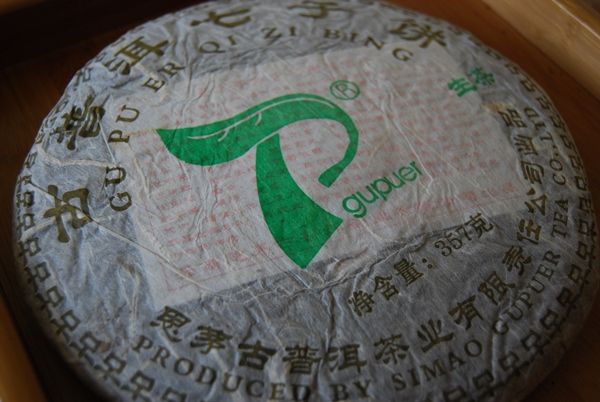
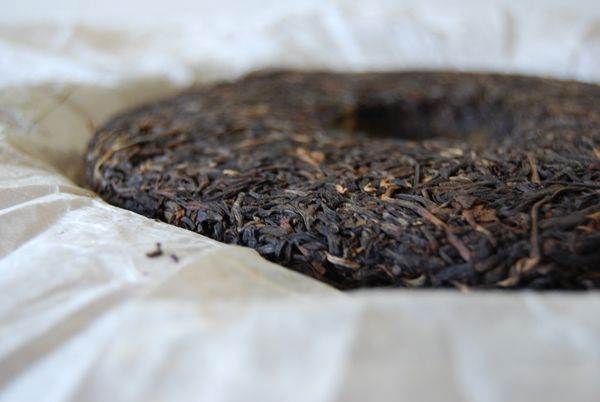
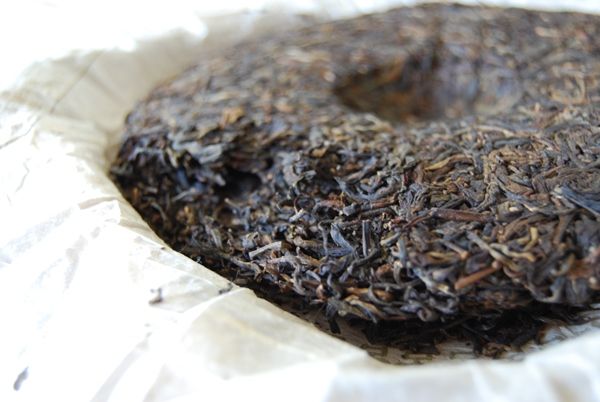
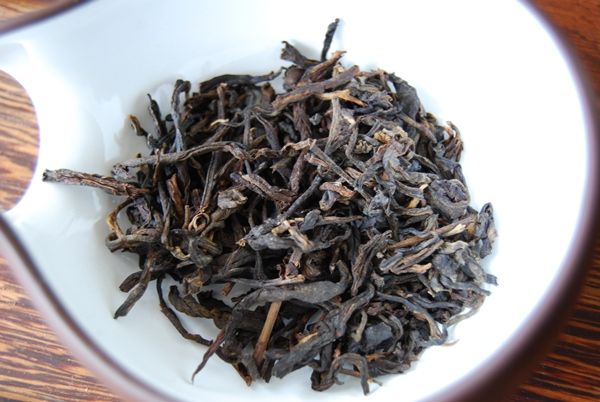
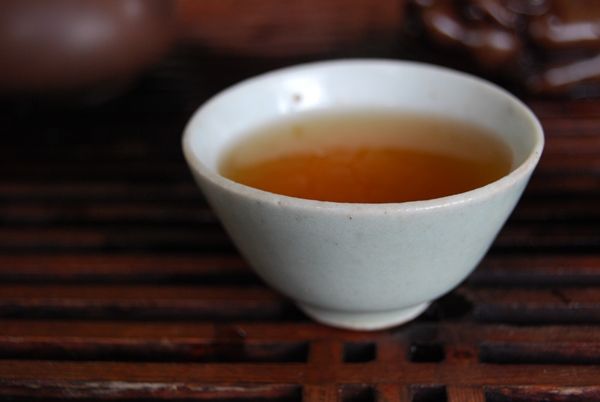
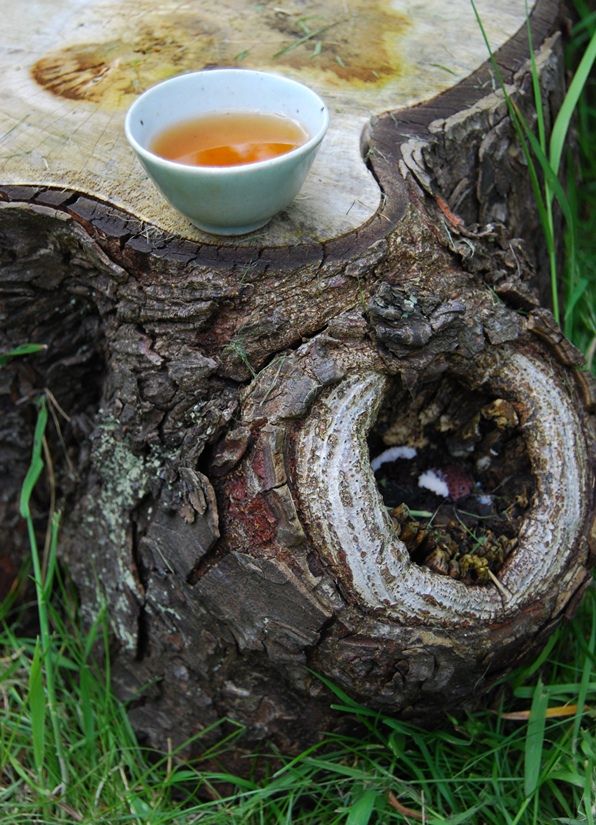
Loving aging that's going on with your tree stump tea table... Use it while you can. Winter's around the corner.
ReplyDelete-DP
Haha...
ReplyDeleteI'm doing a very good job of convincing myself that term isn't around the corner, let alone winter! May the summer months and their casual drinking (and their lack of tutorial-teaching) last for much longer...
Toodlepip,
Hobbes
I'd like to pick up a few cakes of this but have to go through a taobao agent since I don't speak Chinese. Would you be able to the link to this on taobao? Thanks in advance.
ReplyDeleteI've also tried to find this on taobao, I could only find the 2007 blend and a/the 2006 cake. Any hints on finding this? I used babelcarp already.
ReplyDeleteHi, chaps,
ReplyDeleteI had a quick rustle around Taobap to see if I could find the region from which this cake comes, but only found cakes from other years - I'll keep my eyes peeled.
Toodlepip,
Hobbes
Here's the cheap-and-cheerful 2006 Bangwei, for 50 RMB:
ReplyDeletehttp://item.taobao.com/item.htm?id=1552884391
Here's the pleasantly tasty 2010 Qianjiazhai:
http://item.taobao.com/item.htm?id=8608075172
The cake you referred to for 50 RMB in the first link is not the Bang Wei cake... it's 9982 Raw cake (blended). The Bang Wei cake and the 9982 wrapper are slightly different...
ReplyDeleteThe 9982 has the "- - -" around the outer circle of the cake, whereas the Bang Wei has the "古 古 古" symbol all the around the outer circle of the cake wrapper.
The 9982 has Pin Yin "Gu Pu Er Qi Zi Bing" printed below the characters at the top, whereas the Bang Wei does not have Pinyin.
Additionally... the 2010 Gu Pu Er Qian Jia Zhai you referred to in the taobao link is 150 grams, whereas the one you review on half-dipper is 357 grams.
ReplyDeleteDear Scott,
ReplyDeleteWho would have thought that such subtleties would have existed even with Guyi. Thanks for the notes.
Toodlepip,
Hobbes